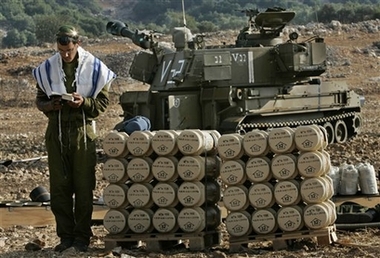Israel's prime minister declared Monday that there would be no cease-fire
with Hezbollah guerrillas, apologizing for the deaths of Lebanese civilians but
saying "we will not give up on our goal to live a life free of terror." His
Security Cabinet approved widening the ground offensive.
Israeli warplanes hit Hezbollah fighters battling with soldiers near the
border as the guerrillas fired mortars into Israel. But an Israeli suspension of
most airstrikes in Lebanon - and a pause by the guerrillas on rocket
attacks in northern Israel - brought both countries their quietest day
since the conflict began three weeks ago.
|

An Israeli gunner prayers at an artillery
position near the Lebanese border in northern Israel, Monday, July 31,
2006. Reacting to withering world criticism, Israel agreed to a 48-hour
suspension of air strikes in Lebanon after a Sunday bombing killed at
least 56 Lebanese, most of them women and children, leveling a building
where they had taken shelter from earlier Israeli attacks.
[AP]
|
Lebanese fled north in overflowing trucks and cars. About 200 people -
mostly elderly - escaped the border town of Bint Jbail, where Israeli
troops and Hezbollah guerrillas fought their bloodiest clashes. Two residents
dropped dead on the road out, one of malnutrition, the other of heart failure.
Some survivors described living on a piece of candy a day and dirty water as
the fighting raged.
"All the time I thought of death," said Rimah Bazzi, an American visiting
from Dearborn, Mich., who spent weeks hiding with her three children and mother
in the house of a local doctor.
The lull was felt across northern Israel, too: In the town of Nahariya,
residents who had been hiding in shelters for the better part of three weeks
began emerging. Supermarkets were fuller than before and more people were in the
streets, walking along the beach and shopping.
But diplomatic efforts to end the crisis faltered, despite increased world
pressure for a cease-fire after the devastating strike in Qana.
Israel's Security Cabinet early Tuesday approved widening the ground
offensive, a participant said, and rejected a cease-fire until an international
force is in place in southern Lebanon.
The participant, speaking on condition of anonymity because he was not
authorized to talk to reporters, said Israel's airstrikes would resume "in full
force" after a 48-hour suspension expires in another day.
Thousands of army reserves have been called up in recent days in advance of
the decision, which is expected to lead to sending more troops into the border
area. Israeli leaders have said they want to carve out a zone about 1 mile wide
that would be free of Hezbollah.